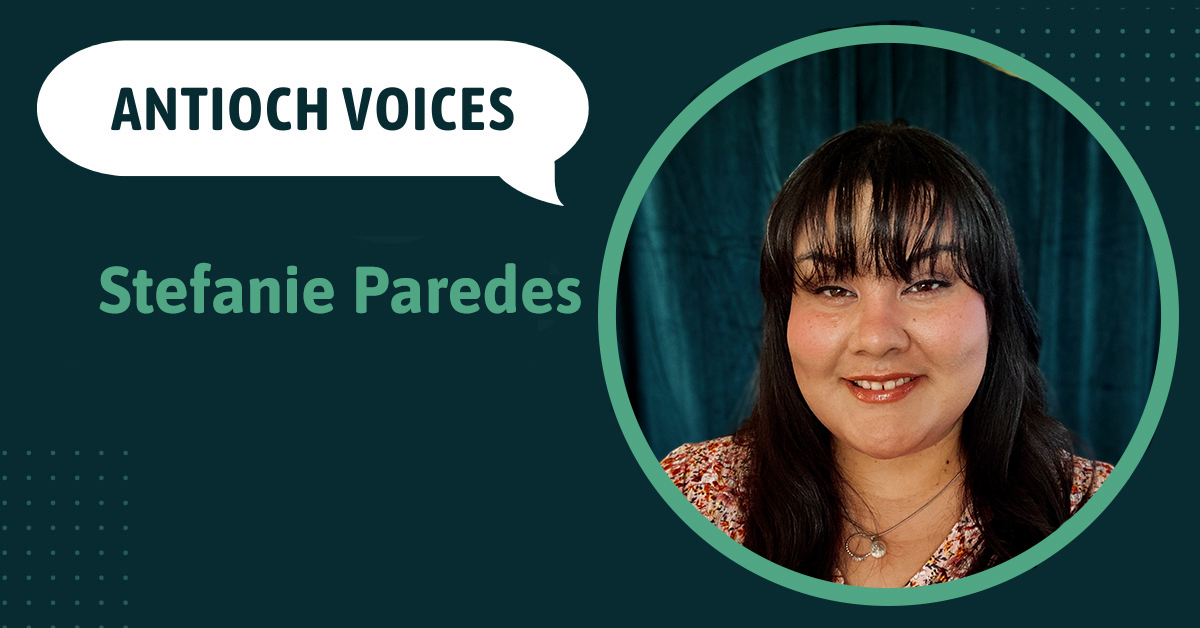This essay is part of Antioch Voices, a forum for Antiochians to speak out about issues important to them. Opinions expressed here belong to the author alone and do not necessarily reflect the official position of Antioch University. If you’d like to share your own voice, the first step is to send a short description of what you are planning to write about to [email protected].
To tell a story can be a tricky thing, for the writer. It can evoke a lot of questions and emotions, sometimes not giving you the answers or relief you desire but instead giving you the same frustration you had before writing. So why do we writers love it?
For me, I don’t know. But the feeling I get when I crack the code to my own story, the moment a character speaks to me, or even the experience of typing “the end”—it evokes something in me as a person. It’s a feeling I will never be able to put into words.
As a screenwriter, my own trauma is a central point of many of the projects I write. The story may not revolve around one event, but it will have a character influenced by someone I know, a location I’ve visited, or a situation I’ve lived through. When something occurs in your life that abruptly changes it, say the loss of a parent, your mind and writing become altered. They’re separated, but it’s dire to keep them synced, even when it seems impossible. You wish you could rewrite the ending, change dialogue, shift some information, be in charge of your own story. But you can’t.
For whatever reason, the universe had its own story for me. On September 28, 2022, at 2:52 pm my mom took her last breath. Fifteen weeks prior, she was diagnosed with stage four gallbladder cancer that had reached numerous organs. “You have a mass that looks to have reached the liver, gallbladder, pancreas, and possibly stomach, and there’s a smaller tumor on your lower spine,” the doctor said as if it was a regular Sunday evening. During those fifteen weeks, we had six hospital visits, an urgent care visit, and two rounds of chemo.
When you’re waiting for someone to get better, you have a lot of time on your hands to keep yourself occupied. I wasn’t in school; I was working a part-time job at a movie theater, and before her diagnosis, I was hardly writing. I began taking notes on everything that was happening, developing a memoir to share with the world one day—I was now writing. I knew this was going to be a journey to document, something to look back on in triumph with my mom. This Fucking Sucks was the best title that I could think of.
I began to write about how I was feeling, the milestones Mom had made, good and bad, the numerous people we’d spend emergency room visits with, and the countless nurses and doctors who graciously helped us through the journey. Documenting this helped me divert my attention. It helped me feel as though I was living through one of my stories, not in it. I couldn’t control the real world, but I could control the way people saw my perception of the situation. Believe it or not, it wasn’t always sad. My siblings and I laughed when we could, watched movies with our mom, comforted her and each other when we needed it, and watched a lot of Friends.
The last week of Mom’s life, we took her to the hospital. It wasn’t looking good, but hell, it was never looking good. We did what we always did and marched on. Then Thursday came. Mom’s doctors told us that her body was shutting down. Though we had gotten to a point where we knew she wasn’t going to beat this cancer, this was the hardest day my siblings and I had been through. It was more painful than the day we learned about her diagnosis, and it would prove to be even more painful than the day she died.
My siblings and I were 33, 27, and 19 at the time. We had made the decision to stop all testing, all the poking and prodding, and bring our mom home to die surrounded by people who loved her. She spent five days in hospice. She was only conscious for one of them. We told her how much she was loved until she finally stopped breathing.
About a month or so after her death, I decided to return to the memoir I was working on during my mom’s illness. I had gained perspective, and I had some ideas for a new direction in how to write it. But as I read what I had written, I became incredibly upset. I was soon on the verge of a panic attack because what I had written was hopeful. I felt incredibly sad for the Stefanie fifteen weeks prior, who was so naive. So I put it away and still haven’t touched it.
When something like this happens, you’re not given a book for what to do next. A mentor suggested I wait eighteen months before writing about my experience, and I followed this advice. My siblings wrote something small every day, a memory of Mom or the trauma we had just experienced—I did not. I would cheat a little here and there, writing long Instagram captions coupled with photos of me and her. I wanted so badly to write something about her because it felt right. I’d always worked through my trauma with screenwriting, and part of me felt that this was no different. I realized that when you’re the child of a single parent, you only lose that parent once. You only have one shot to live through your grief journey.
I bought journals to help me—that was money down the drain. I tried poetry—it helped, but it didn’t satisfy my craving.
I started a screenplay. Then another. Then a play. Then, a short story. On each project, I couldn’t get more than five pages. None of it felt right. How could I write about a world knowing I’d have to kill my own mom, over and over and over again?
I watched movies about parental grief. Interstellar, I realized, is totally about losing a parent—in a bizarre way, yes, but still. Watching it, I felt inspired to be creative to explain grief in a really complicated and meta way. But later, I realized that that’s not who I am as a writer.
Eventually, I thought, I’ll just feel. I’ll allow myself to move through grief. I’ll wait the eighteen months. I’ll let it soak. I’ll keep a mental filing cabinet about everything. Then, when the time is right, I will write the Oscar-Pulitzer-Tony-winning work of my dreams.
Meanwhile, as the days go on, my poor brain is repairing so much of what has been damaged. Memories fade. In my head I see my mom, but it’s a smeared version of her. The loudness of who she was has quieted. I look at her urn every night, thinking, “C’mon Mom, send me that good story, tell me what I have to write.” But she just quietly mocks me.
My motivation to write about her has not lessened. Instead, my frustration about what to write only grows, and the fear of what I’ll feel at that eighteen-month mark heightens. There is no handbook for the grieving writer. To write about grief and to be a writer with grief are two very different experiences. Writing is such a personal and internalized experience. Grief is the most personal experience I’ve ever had.
My siblings and I experienced the same loss, had the same crappy fifteen weeks, and yet our grief is our own. We move through our own worlds unsure of how the other feels. When we talk, things make sense, but no thought, feeling, or emotion is exactly the same.
How do you write about someone successfully enough to put the entire essence of who they are into simple words? How do you create a world when yours feels broken? How do you write from the heart when it isn’t whole? These are the questions I have as a writer with grief.
I was the one to administer the drugs in order for her to find comfort as she passed. Though she was unconscious I would talk to her, I knew she could hear me because she would raise her eyebrows, groan, or move her finger, she had put all of her strength into letting us know she was there. My siblings and I took shifts being by our mother’s side. Knowing she could hear me, I would talk to her while it was my shift and my siblings slept. “We’re going to be okay. I won’t give up. I’m going to win that Oscar and I know you’ll be on that stage with me.” I told her Collins Avenue, the story I dedicated to my mom years before she passed would be made, because she was important to me, and people deserved to know the woman I would simply know as Mom.
Next month will be eighteen months since I lost my mom. It’s not about understanding the grief I have for my mother, but understanding grief as a complex idea. I feel incredibly lost as a writer, so the only choice I have is to write my way out. Though I am not writing about my mom, I have successfully begun the journey of writing characters that experience their own loss, and through this I’ve started to find my way.




